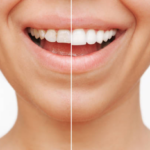Anyone who has felt the pain of a sensitive tooth knows how bad it is. In the eyes of other people, you might seem like you’re complaining about nothing. It’ll be hard for you to ignore the cold sensitivity and the pain it causes until it goes away, but you won’t be able to.
Occasionally, this happens because food, like ice cream, hits your teeth in the wrong way. You may have sensitive teeth if this happens a lot of the time.
Tooth Sensitivity and You
In general, if your teeth are sensitive to cold, they are also likely to be sensitive to hot things. Sensitive teeth don’t like both hot and cold temperatures, like those found in cold air and hot drinks. Dental treatments can help, but what can you do while you wait?
Find out why your teeth bother you in the first place. Then, you can choose the best treatment for your unique situation.
The Factors That Make Your Teeth Feel Sensitive
Something to keep in mind if you have sensitive teeth is that there is always a reason for the pain. True, cold drinks or acidic foods may be the “cause” of the pain right away. It’s true that your oral health isn’t as good as it should be.
If you go to the dentist early, you might be able to fix the problem without causing more damage. Dental treatment is based on the reason why your teeth are so sensitive.
How Will You Know Whether or Not You Have Sensitive Teeth?
Anyone who has experienced pain after drinking cold beverages or hot coffee knows that their teeth are sensitive. If you want to clean your teeth and gums, you don’t have to stop there. Every now and then, the pain spreads and feels like a knife has been shoved right into your head. This is where the term “brain freeze” comes from.
In a nutshell, it’s not fun.
This can happen when a tooth that is sensitive to either cold or heat is exposed to that temperature. The extremes in temperature could cause a very painful toothache. So, you need to know what is going on in order to figure out how to avoid the pain.
The Most Common Causes of Sensitive Teeth
There is a good chance that the enamel on your teeth has been worn down over time. A layer called enamel is on the outside of the tooth. It protects the nerve endings.
Dentin, which makes up enamel, can break down over time because of tooth decay, receding gums, and other things. As a rule, healthy teeth have this kind of tooth covering. However, as the dentin in your teeth wears down, the surface of your teeth wears away. This makes your tooth enamel more sensitive to heat and cold.
Small tubes or canals make up the dentin. Heat and cold get to the tooth’s nerves and cells through these small tubes. Dentin is lost, and this makes teeth more sensitive because they are not strong enough. The first question is why dentin is going away in the first place.
There are a lot of things that could cause your teeth to be sensitive to heat and cold, like:
- cavities
- The first stages of tooth decay
- When a person grinds their teeth (bruxism),
- A disease that has not been treated is called gum disease.
- Gum infections lead to receding gums and eventually to tooth loss.
- A toothbrush with hard bristles or products not approved by the American Dental Association is not good for your teeth.
- Food that is acidic
- A tooth injury, like a broken tooth, can happen to someone.
These are the most common causes of sensitive teeth, but they could also be caused by your daily habits. It can also lead to sensitive dentin, gum disease, and the loss of tooth enamel if you smoke or don’t brush your teeth properly.
How to Treat Tooth Sensitivity
In the beginning, you can try some things you can do at home to see if they help you feel better.
For the first step, buy a soft-bristled brush. If you don’t, you should already own one. Stop using toothpaste that makes your teeth whiter and alcohol-based mouthwashes that make your breath smell bad. These can be too rough and make your teeth hurt. If these changes don’t work, look for signs that you are grinding your teeth while you sleep.
This is bad for both the teeth and the jaw. A headache, neck, or shoulder pain may come on for no reason at all.
Treatment for Bruxism
If you think you are grinding your teeth, make an appointment with a dentist right away. This could be caused by stress, or you might need medical help if you have trouble sleeping. The dentist’s office can help protect your teeth by giving you things like mouth guards that protect your enamel.
In the meantime, your doctor can help you come up with a treatment plan for your tooth grinding, which is called bruxism. There is a deeper reason why you grind and clench your teeth while you sleep, and if you don’t find out what it is, it could be dangerous.
Treatments for Sensitive Teeth at a Basic Level
To fix a sensitive tooth, the type of dental work that needs to be done will depend on the cause and severity of the problem.
The first thing to do is to take safety precautions. Your dentist can work with you to improve your oral hygiene and avoid more damage. This starts by not eating or drinking things that can damage your teeth, like foods and drinks that are high in acid or sugar.
If that doesn’t work, you can use desensitizing toothpaste, brush your teeth a lot, and use floss and mouthwash to keep your teeth and gum line healthy and clean. There are some things you can do if your gums continue to recede or you keep having cold and heat sensitivity. Then, you can move on to the next phase.
Enamel Strengthening
The enamel protects your roots and stops them from coming into contact with the nerve endings that make your teeth sore. A fluoride gel may be used to lessen the risk of sensitivity. You can make your teeth stronger by using this product on a regular basis. It also helps to repair the layer on your teeth that protects them from harm. This can be done in the office during business hours or at home with special tools.
Getting A Root Canal
If you have a cavity, a sealant can be used to make your teeth less sensitive to hot and cold foods. Root canals may be needed if your gum disease has caused your gums to recede, your teeth are sensitive to cold, or your dental roots can be seen.
This is a way to get rid of the infection in the pulp of your teeth. A dental crown will be put on the tooth after the gum line and the tooth are free of infection. This will cover up the visible roots of the tooth.
How Did Your Teeth Start To Become Sensitive? We Can Help You.
When your teeth are sensitive, whether you want to keep your gum line from receding or keep your teeth from decaying, you should go to the dentist. Contact our office now to find out how we can help you get or keep good dental health.










